Ask anyone who's spent a few years in tech, and they'll probably tell you a version of the same story: long but exhilarating days, the chance to stand out and climb ranks fast, and of course, great pay. But none of those details really get into the complex experiences of being a woman—and a mom—at one of the "I would kill to work there" companies that most of us use daily.
That's where Shirin Saleem comes in. As the Senior Manager for Technical Programs at Alexa at Amazon, Saleem knows the tech world from the inside out—and she's not afraid to push for change when she believes it's necessary. She's also got more than a few words of advice for any woman interested in pursuing a career in tech or at Amazon—all gleaned from her first-hand experiences. Here's how she got a seat at the table at one of the world's most lucrative companies.
I spent a majority of my life in India—I was born in the Persian Gulf, in Kuwait, but within the cultural theme of being Indian, with our family, friends, etc. being Indian, I went to an Indian school there and then moved back [to India] during the Gulf War, when I was 8. I lived there until I was 21, before I moved [to America].
Growing up, there was a lot of emphasis on academics—more than you have over here. I was always the “nerd,” focusing on math and making sure I got good grades. My father had a computer science degree from the U.S., which, at that point, was not very common. I always looked up to him and wanted to be exactly what he was. I knew I wanted to be an engineer when I was growing up, and that’s what I ended up being.
When I started out my career, what brought me into this [tech] space was a project I did in undergrad on speech recognition. It was a little project at the time, where I built a small digit speech recognizer. Once I got out of my undergraduate [program], I applied for a master's at Carnegie Mellon. My mentor there was my advisor. I worked for her for a couple of years as a research assistant—she was great at giving me career advice, advice about what I should be doing in terms of projects then and later, what was best suited to my interests.
On What Drew Her to Amazon
It was the role that led me to Amazon. I joined Amazon when Alexa hadn’t launched, when the Echo product hadn’t launched. When I interviewed, I didn’t know exactly what it was that I would be working on, but I knew what the role of a technical program manager would be and that I would be working on speech recognition.
I had eight years of experience [at that point], so I had a pretty good sense of where my strengths were and where I wanted to grow. When this position came up and was described—"a bridge between research and production, you need to have excellent interpersonal skills, you need to look at strategic impact, big picture, and connect the dots"—I thought, “That relates to my strengths really well.” I personally think I wasn't wrong because I have loved the job and thrived in it ever since I made the switch. I haven't lost the connection to speech science, either. I work in the machine learning group, and I bring a lot of value because of my background.
On What She Looks For When She's Hiring
In a hiring situation, Amazon typically has a predefined set of leadership principles, which is a brilliant strategy for finding the right candidate for the job. Of course, every manager has their own set of biases.
I first look for someone who is technically sound. I believe that without that, you won’t succeed in the kind of role I’m hiring for. On the personal side, I want someone who’s got a good sense of ownership and can deal with challenges in the face of ambiguity. That could be ambiguity in ownership—where it’s not really clear whether you need to do something or if someone else should—or, it could be ambiguity in the project itself. I look for someone who is able to break problems down into smaller pieces, solve things one at a time, and then ask the right questions to get past the uncertainty and move forward. I would say ownership, technical skills, and dealing with ambiguity are the top three things I look for.
On Management Mistakes
In the beginning, I was over-cautious with hiring to the extent that it was hard for me to find anyone because I set my own internal bar too high. I learned to work around that, and I realized that I need to make some compromises—you know, I can’t check off everything on the list.
One thing I’ve learned going along is that you have to take a balanced view when you bring people in and when you manage them. Different people have different strengths and different weaknesses. And as a manager, you have to work around that and work with them on that.
I enjoy mentoring people. There is a teaching streak in me, I think. I like sitting down, explaining, bringing my background to the table, my experience, and explaining how things work—the architecture of the systems, how to navigate the organization in terms of program management. I've found it quite fulfilling to be a manager and a mentor.
On Being A Woman Of Color In Tech
I do not let that perspective [of being an "outsider"] stand in the way of anything. Usually, I’m telling people in the room what to do or asking them questions. I’m confident about myself, and what I say. And that’s not something anyone can take away from me, male or female.
Another example: I work, I have two young children, so I have to cut-off at a certain point in the day. I’m not ashamed of that, I don’t hide that, I don’t apologize for it. I tell people what I have to do—I have to go home at this time to pick up my kids from school—so you can work around my schedule. And what I have to show for that, on the other side, is the quality of my work and where I am. So I get past it. I don’t let it stand in the way of anything.
On Balancing Work and Motherhood
Would I like to do more on both sides? Absolutely. Sometimes I wish I could work longer hours, or take that one last meeting to close out a topic before I have to go home. And when I’m home, I’m wishing, “Oh, perhaps I didn’t have to send my daughter to that extra two hours of daycare, if I had picked her up a little earlier maybe we could have done this and that together.”
I think it’s hard, but it’s possible to strike a balance. It depends on what you want and what you think is satisfying. For me personally, I feel like if I didn’t work, or if I short-changed myself in my career, I would be setting a bad example for my two girls. I want them to grow up and be strong, professional career women, and if I don’t set the example, then where will they be?
On Her Daughters' Careers
I just want them to be happy. I want them to do what they want. I think that’s the most important thing. I don't want to steer them in any specific direction, you know, for the love of math or academics or anything in that dimension. I want them to pick up a career where they enjoy what they’re doing—otherwise, I don’t believe that you'll succeed. I want them to be confident, to be bold. I don’t want anything or anyone to slow them down. I expect them to grow up to be confident workers, doing exactly what they want.
On What's Next
I have taken up some pretty big projects, over the last six to nine months having to do with making Alexa a lot bigger than it is right now, in terms of the platform, in terms of capabilities...I definitely want to use that opportunity not just to develop the product—it’s a very complex process with a lot of technical challenges. As I see myself navigating through that, I see myself also growing professionally, getting to the next level in my career, building more of a multi-functional team than I have right now. So that’s what I’m looking for, myself.
And my team, as well, I would expect that they stay with me on that same path.
Walk us through your morning routine.
5:35am: Alarm goes off. Hit snooze.
5:45am: Alarm goes off again (much to my husband’s annoyance). Quickly get ready for the gym.
6-7am: Hit the gym (either a Body Pump or Spin class or just a mindless hour on the elliptical).
7:05-7:15am: Make myself a steaming hot cup of chai, prep for breakfast.
7:15-7:35am: Check email, browse the news, order an item or two on Amazon while drinking my tea (my favorite 20 minutes of the day).
7:35am: Get my girls out of bed and send them off to Dad to brush and get dressed.
7:35-7:50—Make breakfast for the kids (usually either a cup of oatmeal, dosa—an Indian crepe which my kids love, banana pancakes or a PB&J sandwich), pack all of our lunch boxes.
7:50-8:20am: Shower and get ready for work.
8:20-8:25am: Do my daughters’ hair.
8:25-8:30am: Rush everyone out the door.
8:30-9:00am: Drop off the kids at school/daycare and head to work.

What’s a ritual you have to psych yourself up before a big event or meeting?
Prep until the last minute and then a little more. I find that if I am ready early, I get nervous. So I always leave one last thing for the last minute even if I could have done it earlier. That’s when I am able to go in at my sharpest.
Your favorite thing to do with your daughters?
Visiting the Museum of Science in Boston with them and watching their eyes light up when they discover something new.
The must-have apps on your phone?
Whatsapp, BBC News app, Temple Run

What is the best piece of advice anyone ever gave you?
The best piece of advice I got is from my husband and my strongest supporter—“You need to ASK for what you want, otherwise you will not get it." It’s a mindset that doesn’t come naturally to me. Every time I’ve applied it (at work and otherwise), I have been pleasantly surprised and happier as a result.
What’s one thing that would surprise us about your daily responsibilities or schedule?
For a mother of two girls, I find doing my daughters’ hair every morning the hardest part of my day. I’ve tried every product on the market but we still tug and pull and shed a few tears every morning, so I try to rush through it as fast as I can.
What woman would you like to have dinner with, living or dead?
Michelle Obama!
Favorite question to ask “Alexa”?
American history questions. My kids bring back a lot of these and it is so much easier to ask Alexa than to pick up my phone or laptop.
You May Also Like
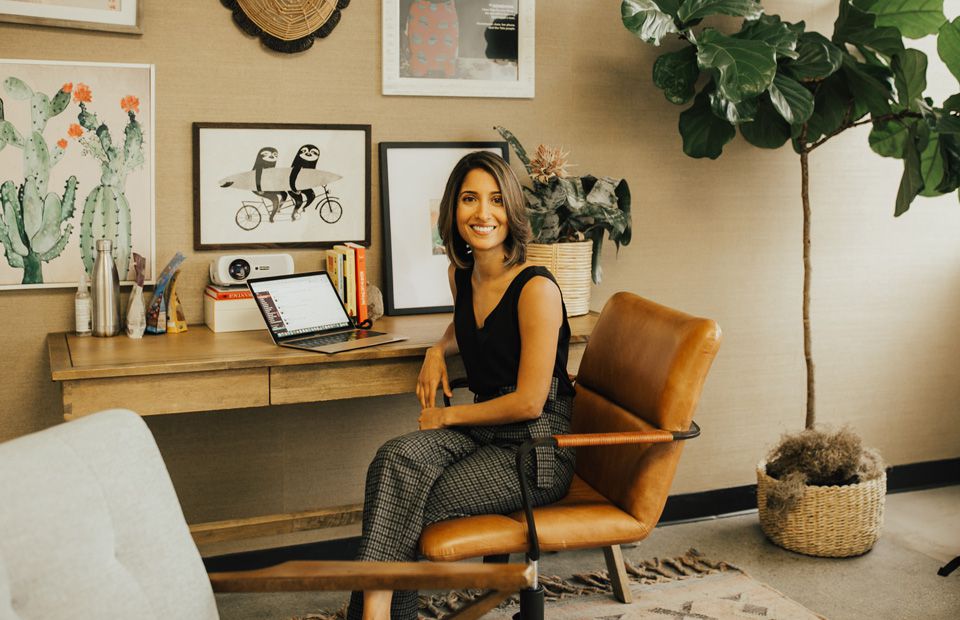
Technology
A Tech Founder on Why Being an Outsider Is a Strength
"I actually think most successful founders are rebels, of a sort. We’re trying to do new things and take on entrenched systems or ways of thinking. What makes me and our company different is that we’re outsiders."
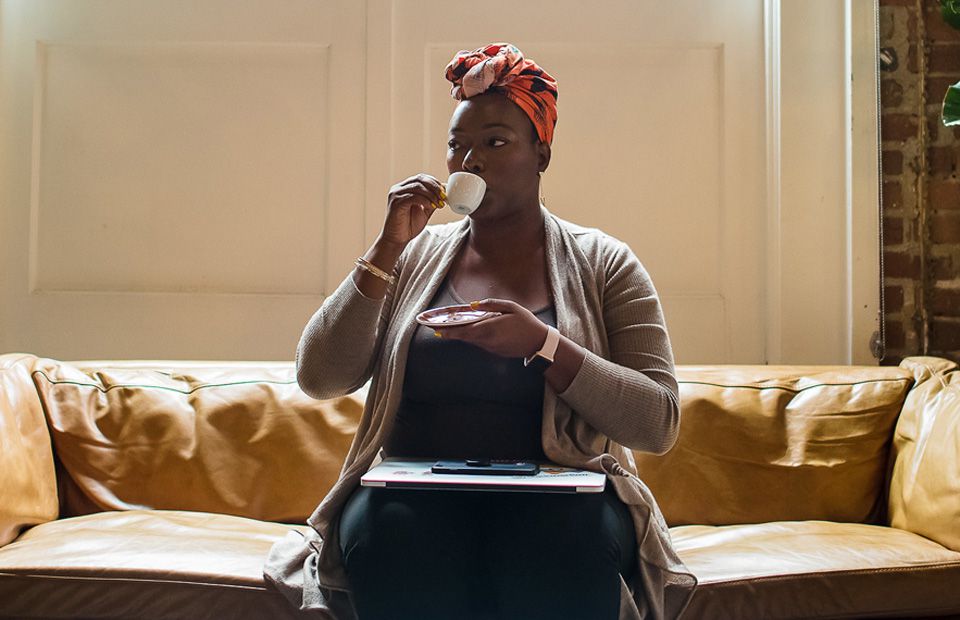
Technology
Omoju Miller—Tech Veteran, Leader, and Volunteer Advisor to the Obama Administration—on The Crucial Role of Creativity in the Tech Industry
"If you are in an environment where you feel marginalized, leave. Don’t try to change it. Go and look for a place that sees you and lets you be you."
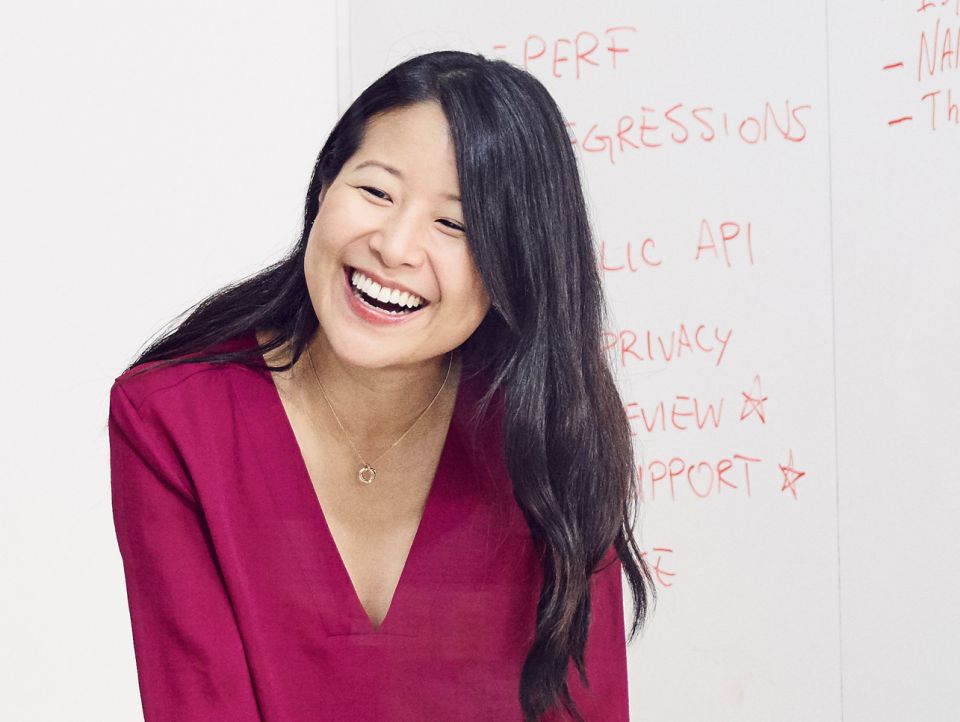
Technology
Sharing Stories as a Software Engineer
We sat down with Apple software engineer Emilie to learn about her day-to-day working at Apple along with what it takes to run the perfect meeting and her favorite ways to unwind.
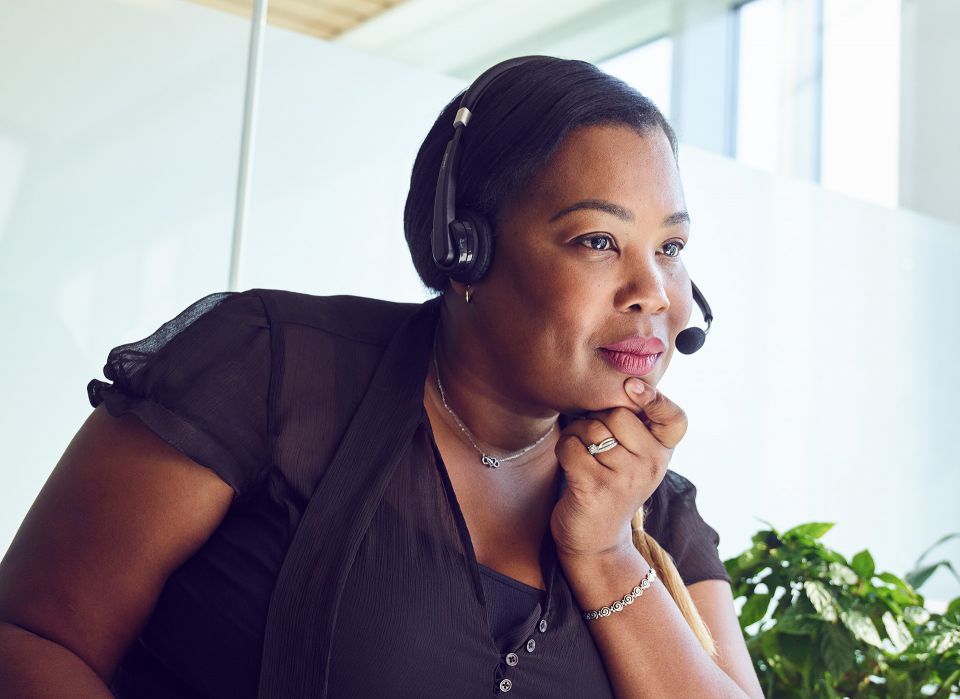
Technology
Creating Impact with Apple
We sat down with Apple's Senior Developer Partner Relations Advisor, Cris, to learn about what it takes to create a lasting impact within a large company. She shares a typical day in the life, her favorite book recommendations, and her top four tips to running a meeting.
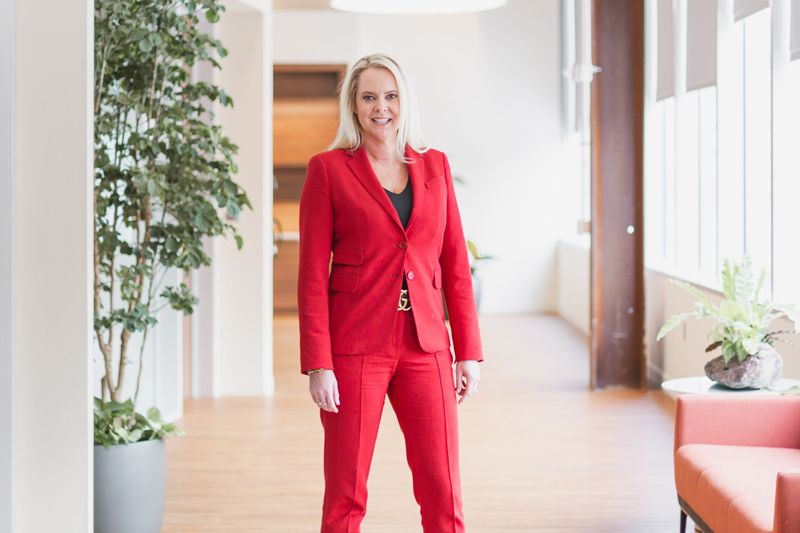
Technology
Salesforce’s Senior Vice President of Sales on Unconscious Bias, Failure, and Innovative Leadership
"Do not be afraid to fail, just bring your best self to the table."
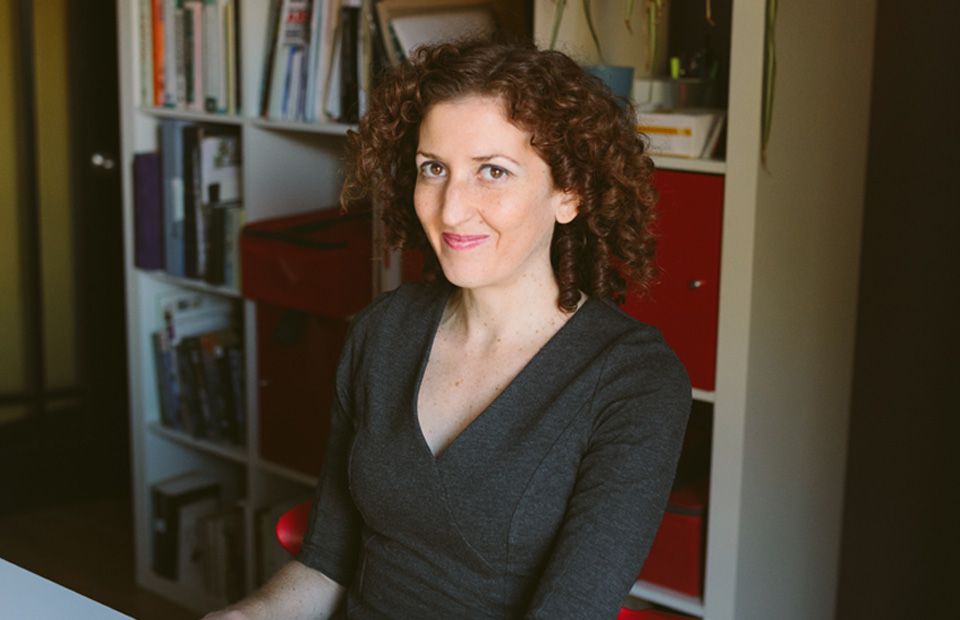
Technology
A Director of Engineering on Tech + Leadership
"I don’t believe in 'having it all'. If you spend more time on one thing, then you spend less time on another thing. All we can do is make choices on how to spend our time."
Get the Best Career Advice Delivered To Your Inbox
Join our newsletter to stay in the loop.
